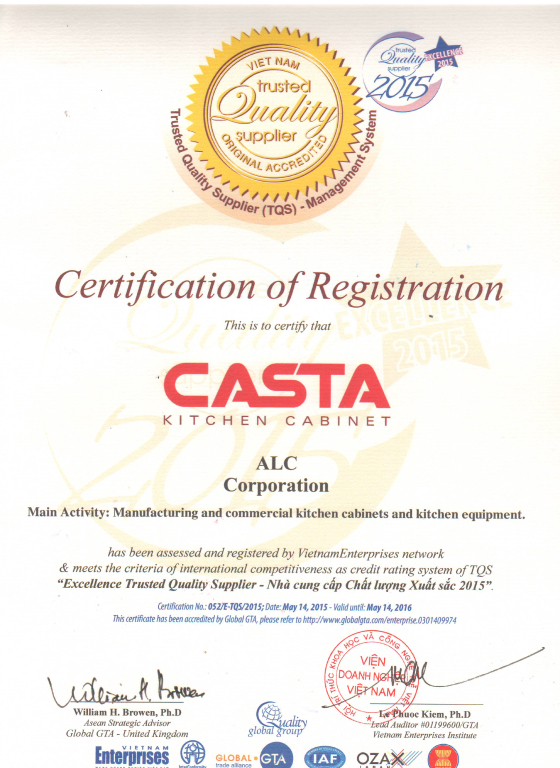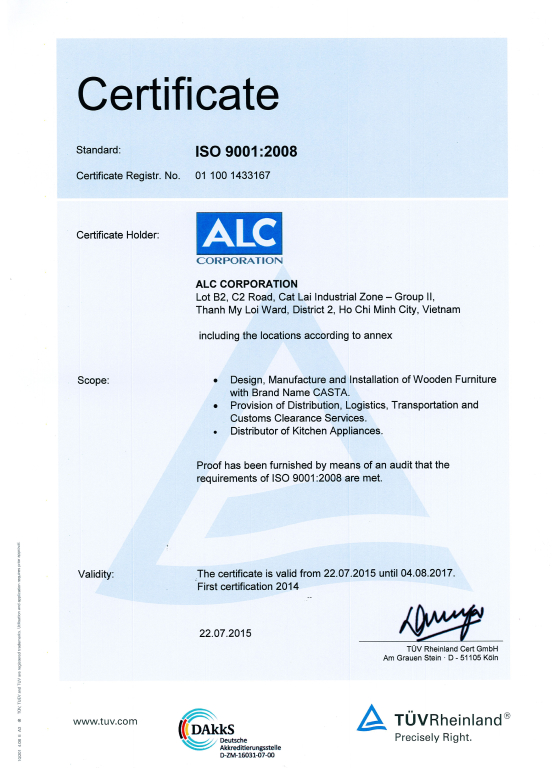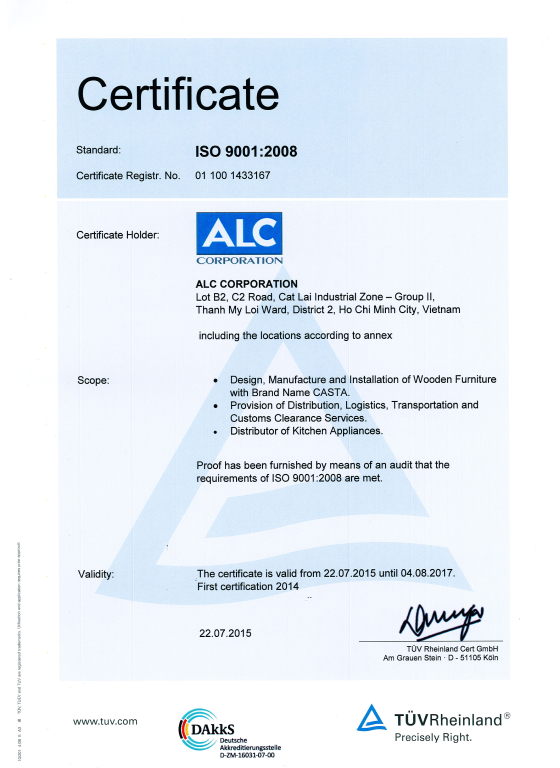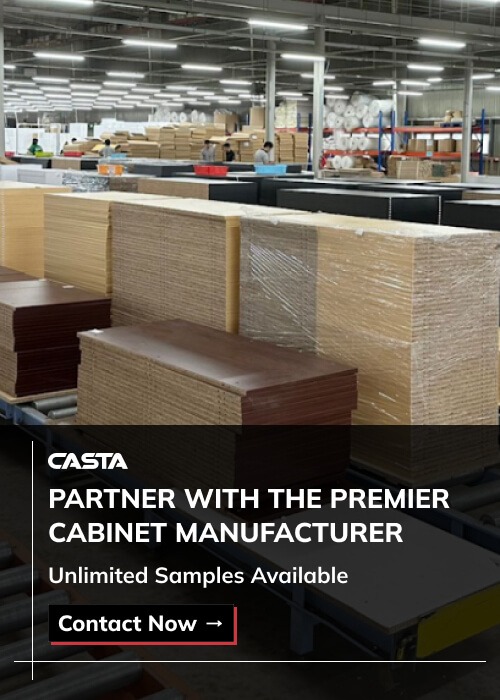Modular-home kitchens often derail schedules and budgets when off-the-shelf cabinets arrive the wrong size or demand on-site trimming. Every missed deadline means extra labor hours, wasted materials, and expensive change orders—eating into your profit margin.
By choosing kitchen cabinet manufacturers association–compliant products, you guarantee performance, durability, and environmental standards that protect both your timeline and your reputation. In this blog, we’ll cover everything contractors, cabinet brands, and furniture companies need to know about the kitchen cabinet manufacturers association (KCMA)—from certification requirements and testing protocols to top-tier overseas options like Casta Cabinetry—so you can specify, purchase, and install with confidence.
Table of Contents
1. Why Certifications Matter When Buying Kitchen Cabinets
The U.S. cabinet market is projected to exceed $34 billion by 2026, driven by new construction, remodels, and commercial fit-outs . In such a competitive space, contractors and brands cannot afford quality lapses or safety recalls. When you source kitchen cabinet manufacturers association–certified products, you tap into a trusted benchmark for durability, moisture resistance, and environmental responsibility.
- Global Sourcing Risks: As more companies look overseas—or offshore suppliers like Vietnam—to cut costs, ensuring consistent quality becomes critical. Without clear standards, cheap imports can lead to failed inspections, callbacks, or negative online reviews.
- Compliance & Trust: The kitchen cabinet manufacturers association sets performance standards (A161.1) that validate construction durability. Its Environmental Stewardship Program (ESP) backs sustainability claims. Together, they demonstrate commitment to both code compliance and consumer safety.
By aligning with KCMA kitchen cabinet manufacturers association standards, you elevate your product offerings, reduce liability, and win bids by showcasing verifiable quality. Let’s explore how KCMA works and why it’s essential for every contractor and brand.
2. What Is the Kitchen Cabinet Manufacturers Association (KCMA)?
2.1 KCMA Overview
Founded in 1955, the kitchen cabinet manufacturers association is a U.S.–based non-profit trade organization that represents cabinet manufacturers, suppliers, and related industry stakeholders. Its membership includes major brands such as MasterBrand, American Woodmark, Wellborn, and many others committed to quality and innovation. KCMA develops industry standards, testing protocols, and compliance systems that help contractors, builders, and designers source with confidence.
- Membership Base: Over 100 participating manufacturers, spanning small custom shops to multi-facility production lines.
- Mission: To “promote and enhance the interest of the kitchen and bath cabinetry industry by developing and maintaining standards, shaping public policy, and providing education” .
2.2 What KCMA Does
The KCMA kitchen cabinet manufacturers association offers three core functions:
- Product Certification: The KCMA A161.1 Performance Certification evaluates cabinetry for durability, structural integrity, finish resilience, and moisture resistance through rigorous third-party testing.
- Environmental Compliance: The Environmental Stewardship Program (ESP) validates sustainable practices, ensuring low-VOC finishes, responsible wood sourcing, and efficient manufacturing processes.
- Advocacy & Education: KCMA lobbies for fair trade, supports anti-dumping enforcement, and publishes industry data, including annual market surveys and trend reports.
By adhering to kitchen cabinet manufacturers association standards, members demonstrate a shared commitment to excellence and transparency—attributes that resonate with discerning contractors and end users alike.
2.3 Sample Checklist: How to Identify a KCMA-Qualified Cabinet Supplier
Before signing a contract or placing an order for kitchen cabinet manufacturers association–certified products, verify these key points:
- Directory Listing: Is the product listed in the KCMA Certified Cabinets Directory? Visit kcma.org and search by brand or model number.
- Certification Seal: Does the cabinet display the rectangular KCMA A161.1 seal inside the cabinet box or on the drawer bottom?
- ESP Documentation: If sustainability matters to your project, ask for ESP environmental certification documents.
- Third-Party Test Reports: Can the supplier provide current lab reports (e.g., moisture resistance, 25 lb. shelf load, 10 000-cycle drawer test) from a KCMA-approved testing facility?
- Membership Status: Is the manufacturer a current KCMA member? Check the latest KCMA membership roster.
- Performance Indicators: Do their cabinets meet performance thresholds, such as 500 lb. box load, 25 000 hinge cycles, and finish resistance to hot water, vinegar, and detergent?
Ensuring your supplier checks these boxes guarantees that their kitchen cabinets for modular homes or any installation will pass inspection, eliminate on-site failures, and safeguard long-term performance.
3. KCMA A161.1 Performance Certification: What It Covers
The ANSI/KCMA A161.1 certification is the industry’s recognized performance standard for kitchen and bathroom cabinets in North America. It ensures that cabinets meet strict durability and construction requirements — and is essential for contractors and developers looking to specify quality-assured products.
Testing is performed by independent, third-party laboratories on production-run samples, not prototypes, to ensure real-world reliability.
3.1 Key Testing Areas in the A161.1 Standard
- Structural Integrity
Cabinet boxes must support a static load of 500 pounds without deformation or failure.
- Door Operation
Cabinet doors are opened and closed 25,000 times under controlled conditions to test hinge performance and alignment retention.
- Drawer Strength
Drawers must complete 15,000 open-close cycles under load without failure or loss of smooth operation.
- Finish Durability
Cabinet finishes must resist exposure to hot water (190°F), vinegar, detergent, and coffee for 24 hours without blistering, peeling, or discoloration.
- Humidity Resistance
Cabinet components are tested for 48 hours in a chamber with 120°F temperature and 70% relative humidity. Structural performance must remain intact.
3.2 KCMA ESP (Environmental Stewardship Program)
In addition to structural testing, the KCMA also offers the ESP certification for manufacturers who meet environmental responsibility benchmarks. This includes:
- Use of low-emission materials (CARB Phase 2, E1 compliance)
- Verified sustainable wood sourcing
- Manufacturing waste reduction practices
- Energy-efficient operations
Together, A161.1 and ESP certifications demonstrate that a cabinet product is not only durable and functional but also safe for indoor environments and responsibly made.
4. KCMA Environmental Stewardship Program (ESP) Certification
Beyond performance, the kitchen cabinet manufacturers association recognizes the importance of environmental responsibility. The ESP stamp indicates that a manufacturer follows sustainable best practices throughout raw material selection, production, and community engagement.
| Criteria | What It Means |
| Air Quality | Use of low-VOC finishes and CARB-compliant panel cores to minimize indoor pollutants. |
| Product Resource Management | Utilization of recycled materials, responsibly harvested wood, and supplier audits to ensure sustainable sourcing. |
| Process Resource Management | Efficient manufacturing processes that optimize energy and water usage, reduce waste, and recycle production scrap. |
| Community Relations | Ethical labor practices, transparency in supply chains, and support for local communities. |
Over 60+ manufacturers currently hold the ESP seal, reflecting a commitment to both environmental protection and worker safety. ESP certification complements CARB Phase 2 and FSC certifications, offering contractors an integrated framework for high-performance kitchen cabinets for modular homes that meet green building standards.
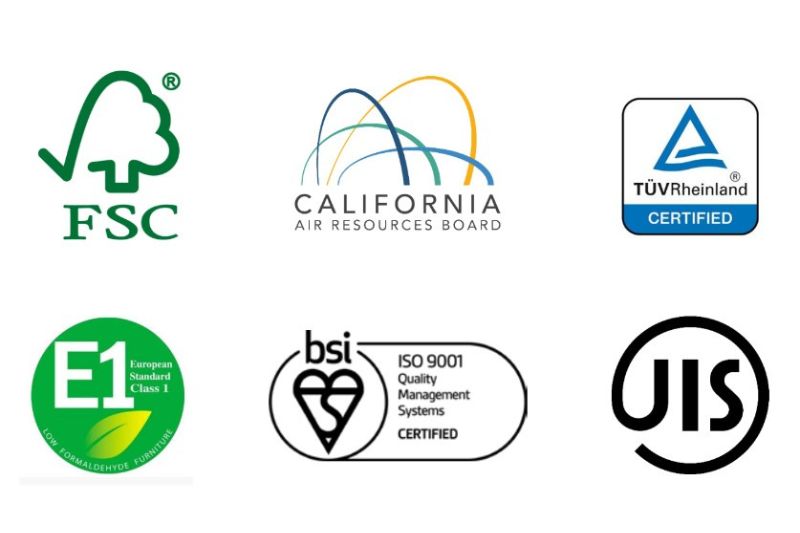
5. KCMA vs. Other Global Certifications
When specifying kitchen cabinets for modular homes, it’s common to encounter multiple certification logos. Understanding how KCMA fits into the broader landscape helps you select the right products for your project.
| Certification | Origin | Focus | Trusted In |
| KCMA A161.1 | USA | Construction & durability | U.S. & Canada |
| CARB Phase 2 | USA (CA) | Formaldehyde emission limits | USA, especially California |
| FSC Mix-Credit | Global | Sustainable wood sourcing | U.S., EU |
| E1 | EU | Low-VOC formaldehyde compliance | Europe, Canada |
| JIS F Four-Star | Japan | Material quality & emission standards | Asia, International |
- KCMA A161.1 focuses on end-product performance—load-bearing, cycle tests, finish durability—critical for kitchen cabinet longevity.
- CARB Phase 2 ensures panel core materials meet strict formaldehyde thresholds (<0.05 ppm).
- FSC Mix-Credit confirms that a portion of wood originates from responsibly managed forests.
- E1 and JIS F Four-Star certifications further validate low-VOC and material safety, often used in commercial or international builds.
Learn more: Cabinet Certifications
Guidance for Contractors: When sourcing overseas—particularly from Vietnamese suppliers—verify that your kitchen cabinets for modular homes carry KCMA A161.1 and at least two complementary certifications (e.g., CARB Phase 2, FSC, or E1) to meet U.S. code requirements and green-building criteria.
6. How to Choose KCMA-Certified Cabinets: A Step-by-Step Guide
Follow these five steps to ensure you select truly kcma kitchen cabinet manufacturers association–compliant products that meet your specifications:
- Confirm KCMA A161.1 Certification
- Visit kcma.org and access the “Certified Product Directory.”
- Search by brand or SKU to verify that your prospective supplier is listed.
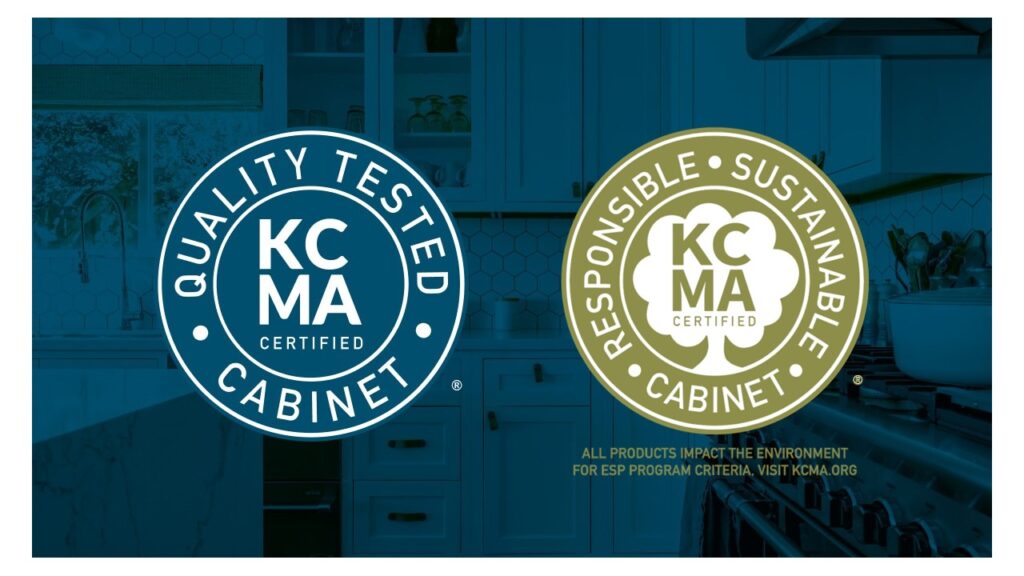
- Ask for Third-Party Test Reports
- Request copies of recent lab reports, confirming that cabinets passed structural, cycle, and finish tests.
- Verify that testing was performed by a KCMA-approved facility within the last 12 months.
- Request Material Certifications
- Combine A161.1 with CARB Phase 2, E1, and FSC certificates for comprehensive compliance.
- If sustainability is a priority, confirm inclusion in the ESP program.
- Evaluate Packaging & Installation Readiness
- KCMA standards assume cabinets can survive long-haul shipping—inspect packaging for ISTA test markings.
- Confirm that all hinge and drawer holes are CNC-drilled and labeled to match your modular design plans.
- Conduct a Site Mock-Up (When Possible)
- If feasible, request a sample or mock-up cabinet bump-in to confirm fit, finish, and hardware operation before bulk production.
- This step validates that your kitchen cabinets for modular homes align with on-site shell dimensions and installation workflows.
By following this checklist, you minimize risk, avoid mis-orders, and ensure every cabinet arrives ready to install, keeping your project on schedule and within budget.
7. Can Overseas Manufacturers Like Casta Cabinetry Meet KCMA Standards?
As more contractors and cabinet brands evaluate offshore partners to reduce costs without sacrificing quality, a common question emerges: can a Vietnamese supplier truly match kitchen cabinet manufacturers association benchmarks? The answer is a resounding yes. Casta Cabinetry—one of the premier cabinet manufacturers in Vietnam—has built its processes around meeting and often exceeding KCMA kitchen cabinet manufacturers association standards (A161.1 Performance Certification and related protocols).
Below, we examine how Casta aligns with every critical KCMA requirement, making them a viable option for kitchen cabinets for modular homes and other high-demand applications.
7.1 Case Study: Casta Cabinetry (Vietnam)
Factory Overview
- Size & Automation: Casta operates two adjacent 100 000 m² facilities outfitted with over 90 percent automation, thanks to European CNC machinery (Homag, Biesse, SCM). This level of mechanization ensures cutting tolerances consistently within ±0.1 mm—an essential factor in satisfying kitchen cabinet manufacturers association tolerances for panel precision and joinery accuracy.
- Monthly Export Capacity: At full throttle, Casta ships over 200 40-ft containers each month, supplying kitchen cabinets for modular homes to North America, Europe, and Australia. This global reach underscores their ability to maintain kcma kitchen cabinet manufacturers association compliance across high-volume production runs.
- Certifications & Third-Party Testing: Casta holds multiple certifications—CARB Phase 2, FSC Mix-Credit, E1 low-VOC, and JIS Four-Star formaldehyde standards. To validate KCMA kitchen cabinet manufacturers association equivalency, Casta engages independent, KCMA-comparable labs to perform A161.1–style performance tests on representative production in each product line.
Learn more: Casta’s OEM Cabinet Manufacturer
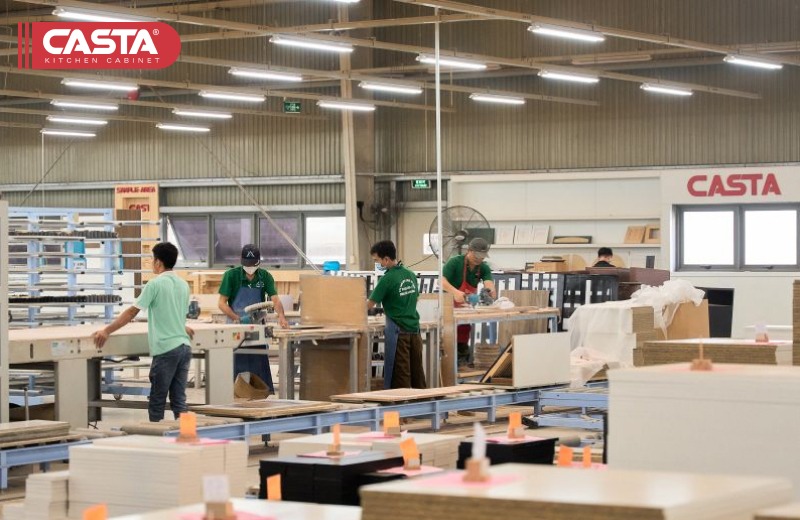
Casta’s KCMA-Comparable Performance
- Structural Integrity Testing: In accordance with kitchen cabinet manufacturers association A161.1 requirements, Casta’s reinforced plywood and high-density MDF cores are subjected to a 500 lb. static load test. Panels and carcasses maintain rigidity and show no signs of deformation, mirroring KCMA’s box load criteria.
- Cycle Testing for Doors and Drawers: All Casta cabinet doors undergo a 25 000-cycle hinge life test, and drawers face 15 000 open–close cycles under rated loads—exactly matching KCMA kitchen cabinet manufacturers association performance thresholds. Post-test inspections confirm no hinge loosening, no track separation, and drawer slides retain full extension functionality.
- Finish & Humidity Resistance: Cabinet face frames, door veneers, and exposed edges utilize UV-cured, low-VOC coatings. Casta’s finishes resist 190 °F hot-water immersion, 24-hour vinegar exposure, and detergent soak without blistering or discoloration. Meanwhile, box components endure 48 hours at 120 °F and 70 percent relative humidity, demonstrating no warping—equivalent to KCMA A161.1 humidity resilience tests.
Why It Works for U.S. Clients
- Design Collaboration & Alignment: Casta’s engineering team offers 3–5 rounds of 3D/BIM design revisions to ensure every dimension, hinge boring, and door overlay meets U.S. cabinet layout standards and kitchen cabinet manufacturers association pre-drilled specifications. This iterative process minimizes on-site fitting issues and aligns with modular-home shell requirements for kitchen cabinets for modular homes.
Learn more: Casta’s Ideal Custom Cabinets
- Health-Safe Material Options: All substrate choices—CARB Phase 2–compliant MDF, FSC-certified plywood, or solid hardwood—carry kcma kitchen cabinet manufacturers association standards equivalency. Clients can specify E1-grade cores for ultra-low formaldehyde emissions, guaranteeing indoor air quality consistent with KCMA guidelines.
- Logistics Efficiency & Cost Savings: With average FOB lead times of 30–45 days to major U.S. ports, Casta competes with Chinese and Canadian suppliers on speed. Their landed costs run 30–40 percent below comparable domestic kitchen cabinets for modular homes, thanks to lower labor rates and tariff benefits. This cost efficiency empowers contractors and brands to offer kitchen cabinet manufacturers association–certified builds at more competitive price points.
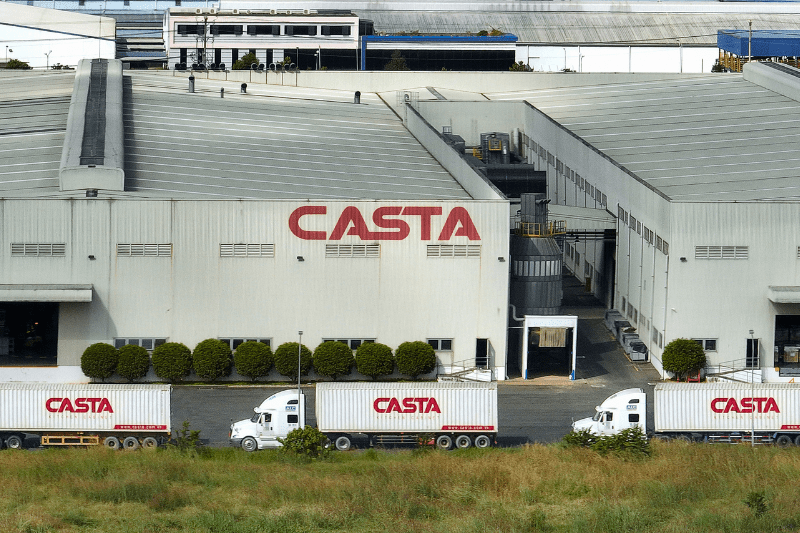
- Comprehensive Documentation & Compliance Packet: Every shipment from Casta includes a full compliance packet—independent KCMA-style test certificates, CARB Phase 2 emission reports, FSC chain-of-custody documentation, and JIS formaldehyde test results. This comprehensive paperwork streamlines U.S. customs clearance and ensures that your kitchen cabinets for modular homes meet kcma kitchen cabinet manufacturers association standards without delay.
Key Insight: Contractors and cabinet brands specifying kitchen cabinets for modular homes can rely on Casta Cabinetry to deliver KCMA-grade performance, precise CNC machining, and green certifications—while enjoying significant cost and lead-time advantages over most domestic or other offshore options.
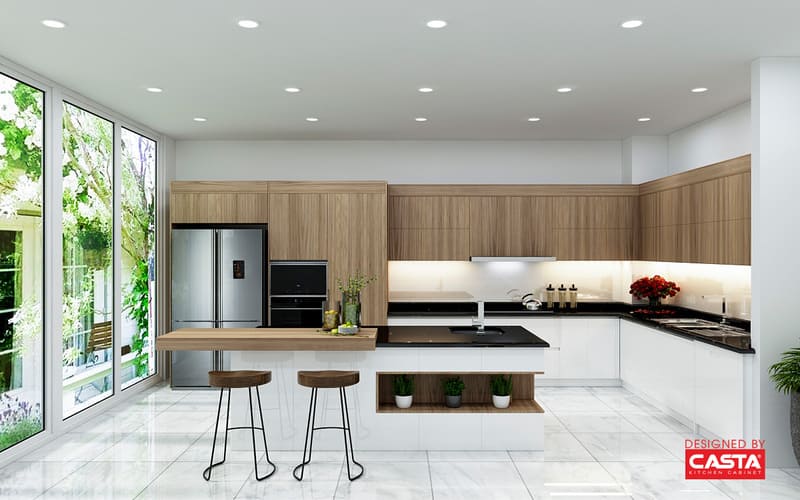
Learn more: Casta’s Outstanding International Projects
By leveraging Casta Cabinetry’s KCMA-comparable processes, you can confidently specify kitchen cabinets for modular homes that match top U.S. producers in structural durability, finish resilience, and environmental performance—at a fraction of the cost. Whether your project demands fast shipping, strict green credentials, or high-volume consistency, Casta stands ready to meet kitchen cabinet manufacturers association standards and help you deliver flawless installations on time and under budget.
8. Common Misconceptions About KCMA-Certified Cabinets
Even experienced buyers sometimes misunderstand what kcma kitchen cabinet manufacturers association standards cover. Let’s debunk a few myths:
- Myth 1: Only U.S. factories can meet KCMA standards.
Reality: Many Vietnamese, Canadian, and European suppliers (like Casta Cabinetry and Elias Woodwork) follow or exceed KCMA/A161.1 performance criteria . - Myth 2: KCMA equals eco-certification.
Reality: KCMA’s A161.1 focuses on durability and performance. Environmental stewardship is covered separately under the ESP program—look for “ESP” or “FSC Mix-Credit” alongside your KCMA seal. - Myth 3: KCMA cabinets are automatically expensive.
Reality: While testing and compliance add costs, KCMA certification often reduces long-term expenses by minimizing defects, callbacks, and warranty claims. Sourcing from cost-optimized regions like Vietnam can deliver certified quality at competitive prices.
Understanding these distinctions ensures you make informed purchasing decisions that align with both budget and quality goals.
9. Key Takeaways & Next Steps
Adopting kitchen cabinet manufacturers association (KCMA)–certified products helps you:
- Avoid Delays: Certified cabinets arrive pre-tested for fit, durability, and finish—reducing costly jobsite rework.
- Protect Margins: Minimize callbacks and warranty claims by specifying performance-guaranteed cabinets.
- Support Sustainability: ESP and FSC partnerships reinforce your brand’s environmental responsibility.
- Expand Supplier Options: Beyond U.S.-based producers, global partners like Casta Cabinetry offer certified quality with flexible design and cost-effective export support.
Whether you're sourcing for modular builds or luxury interiors, aligning with KCMA standards ensures every project is completed on time, on budget, and with reliable quality.
Quick Buyer Checklist to Verify KCMA-Certified Cabinets:
- Look for the KCMA A161.1 stamp inside cabinet doors or drawers.
- Ask the supplier for valid certification documentation for each product line.
- Confirm the manufacturer follows third-party testing and ESP compliance.
- Review product specs for durability tests, hinge cycles, and moisture resistance.
Start at kcma.org to browse approved lines, download performance data, and request supplier contacts.
10. FAQ: Kitchen Cabinet Manufacturers Association (KCMA)
What is KCMA certification?
Does KCMA certification ensure the cabinets are eco-friendly?
Can Vietnamese cabinet suppliers meet KCMA standards?
How do I verify if a cabinet is KCMA-certified?
Is KCMA certification required by law in the U.S.?

Top Cabinet Manufacturers in Florida: A Capability-Based Buy...
Cabinet manufacturers in Florida play a critical role in one of the fastest-growing construction markets in North Americ...
01/10/2026 | David Nguyen
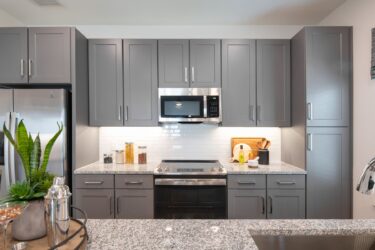
Top North Carolina Cabinet Manufacturers | Best NC Kitchen ...
North Carolina cabinet manufacturers have long been trusted across the U.S. thanks to the state’s deep heritage in woodw...
01/08/2026 | David Nguyen
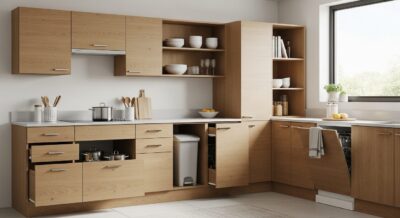
Top Cabinet Manufacturers in Arizona | Best Arizona Kitchen ...
Cabinet manufacturers in Arizona have gained increasing attention as construction activity accelerates across Phoenix, T...
01/06/2026 | David Nguyen

Top Cabinet Manufacturers Indiana | Best Indiana Kitchen Cab...
Cabinet manufacturers Indiana have become increasingly relevant as contractors and developers look for dependable Midwes...
01/04/2026 | David Nguyen
Contact us
Casta is always ready to listen and answer all customers' questions
